How Strict Are Cookie Consent Laws in Asia-Pacific? (APAC Deep Dive & Guide)
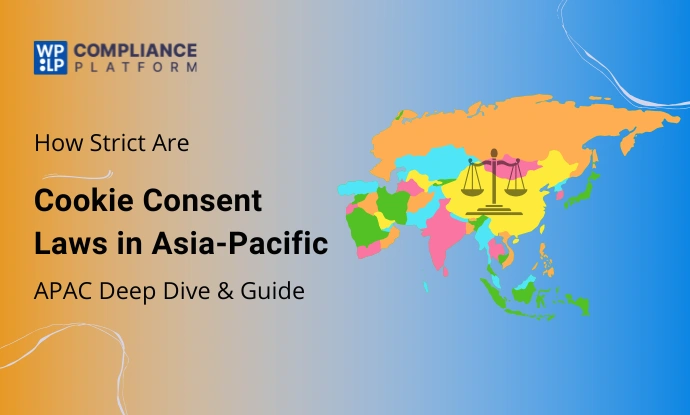
Summary
Regulators are auditing companies and handing out fines, thus moving businesses from a “notice only” banner approach to consent-first.
To be compliant, companies should localize their banners, allow for granular consent, maintain audit logs, and be aware of cross-border data rules. Tool providers like WPLP Compliance Platform simplify these tasks.
If you are running a website in India, Australia, or Singapore, the laws around cookies and tracking may not be clear, unlike Europe, where GDPR has set standards.
APAC cookie law is a patchwork of regulators. However, some countries require strict opt-in consent, while others still allow implied consent with a simple notice.
So how do you navigate this complex landscape? And most importantly, what are the risks if you’re wrong?
In this guide, we’ll take a deep dive into the actual state of cookie consent in APAC.
Furthermore, we will break down country-specific requirements and show you practical steps to stay compliant without any non-compliance risk.
- APAC Overview: Why Cookie Law Compliance Is Gaining Urgency
- Region-by-Region Analysis
- Common Patterns and Unique Challenges in APAC Compliance
- Global vs APAC: International Cookie Law Comparison
- Practical Steps for Achieving Asia-Pacific Cookie Compliance
- Tools & Solutions: How the WPLP Compliance Platform Supports APAC Sites
- Frequently Asked Questions (FAQ)
- Conclusion
APAC Overview: Why Cookie Law Compliance Is Gaining Urgency
Privacy laws in APAC are more flexible than those of the EU and the US, but that’s changing now.
The EU’s GDPR has inspired several countries in the region, especially India and Japan, to introduce new, comprehensive data protection laws.
Regulators are taking a more active approach by imposing significant fines for data breaches and other non-compliance.
Companies are working to move beyond simply providing a notice for consent with an “accept” banner to a more comprehensive and consent-focused approach.
One notable example is South Korea’s Personal Information Protection Commission (PIPC). The regulator has recently taken enforcement actions against top Korean companies.
Those companies fail to protect users’ personal data and are fined. This shows how seriously regulators in the region are treating data protection.
They are no longer waiting for a breach before taking action. They are now auditing and punishing poor privacy practices.
The reason why cookie consent and APAC cookie compliance are becoming so important right now comes down to two main drivers.
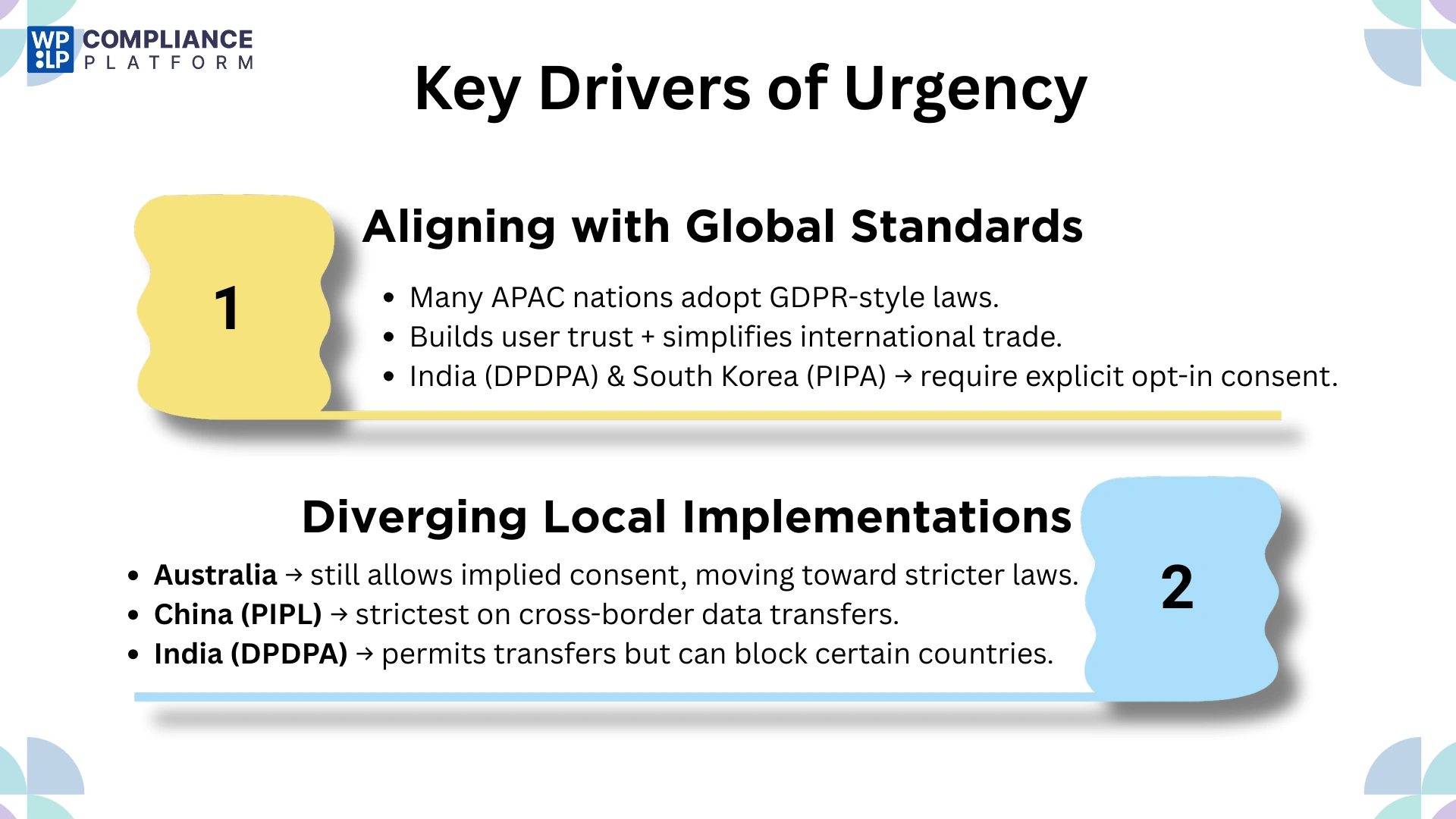
1. Aligning with Global Standards
An increasing number of APAC countries are adopting the GDPR framework for data protection.
The reason for this shift is that alignment with the GDPR framework will make international trade easier and boost trust with users.
India’s data protection laws, through the Digital Personal Data Protection Act (DPDPA), and South Korea’s Personal Information Protection Act (PIPA) show a transition toward the GDPR framework because they provide explicit consent.
Because of this shift, website owners can have a clear opt-in model in a cookie policy.
2. Diverging on Local Implementation
While the alignment is global, each APAC cookie law has its own twists to address local needs.
For example, Australia still allows for implied consent in some situations, but they are reforming, which may transition it into stricter paradigms.
China’s PIPL does even more. It has stringent rules with respect to cross-border data transfers, while India’s DPDPA allows transfers but holds the right to block any country.
Let’s see a region-by-region report and drive deep into it.
Region-by-Region Analysis
Cookie consent varies significantly across the APAC region.
To help clarify matters, we’ve highlighted some of the major APAC cookie law regions and their cookie consent laws.
Here is a breakdown of key markets, focusing on what site owners need to know.
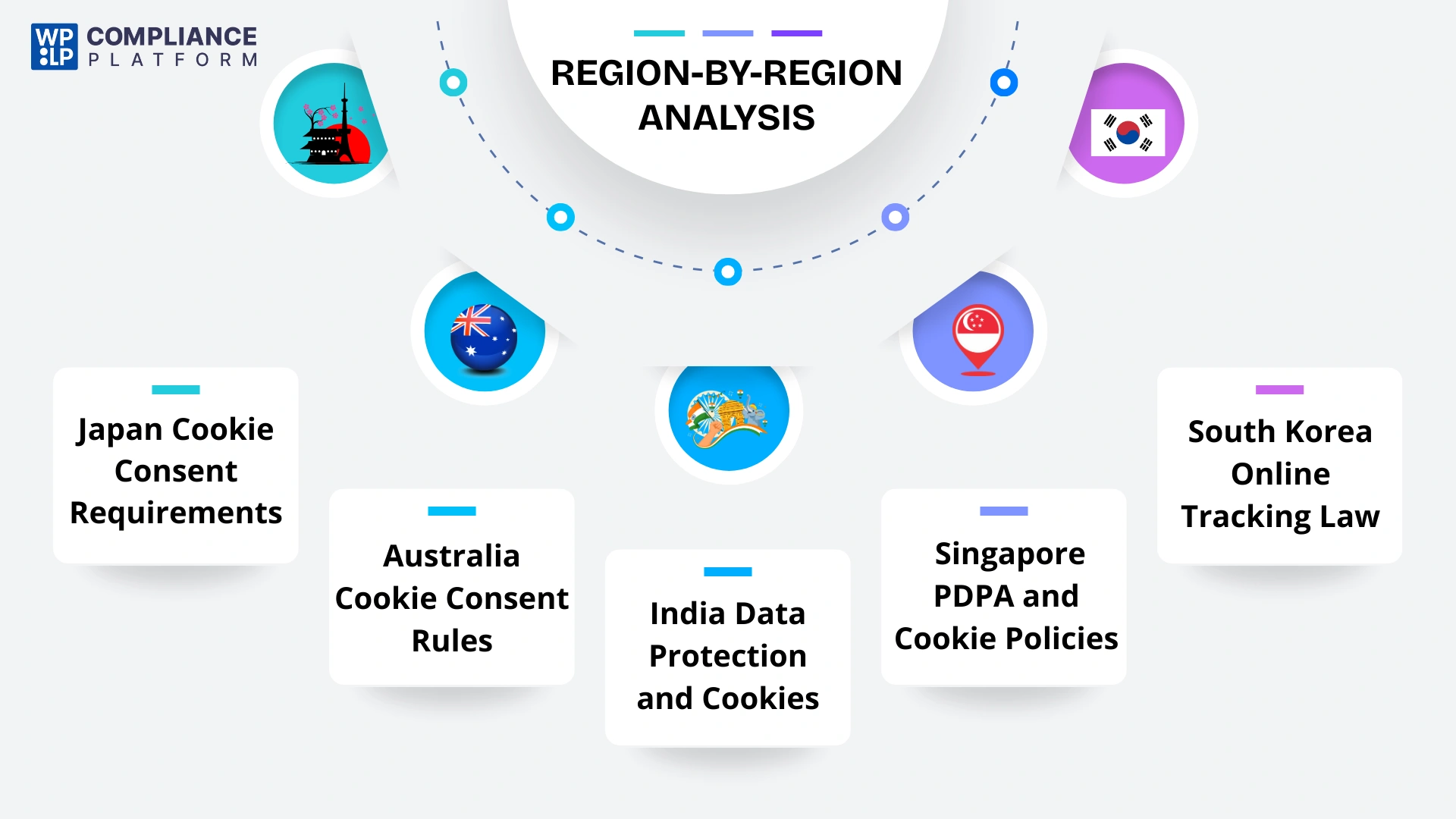
1. Japan Cookie Consent Requirements
Is opt-in consent needed for cookies? Japan’s cookie consent under the Japan’s Act on the Protection of Personal Information (APPI) primarily requires opt-in consent for the transfer of personal data to a third party.
This is relevant for cookies as they relate to third-party cookies used in advertising and other analytics, as they will typically share data with ad networks and other such services.
At least a notice is acceptable for first-party cookies that do not transfer personal data to third-party entities.
Scope: Japan’s cookie consent law specifically covers “personal information” and “personal identifier codes,” and it applies when cookies collect data that can identify an individual.
Enforcement/Takeaways: The Personal Information Protection Commission (PPC) can issue orders requiring the entity to comply with a risk of a fine of up to JPY 100 million (approximately $689,000 USD) for violating an order.
This means the site owner must specify the purpose of the third-party data collection and obtain opt-in consent prior to the activation of third-party cookies.
2. Australia Cookie Consent Rules
Is opt-in consent needed for cookies? There are no specific Australian cookie consent rules in Australia’s Privacy Act 1988. However, according to Australia’s APPs, organizations will be processed when handling “personal information” transparently and openly.
If the cookies you collect can identify an individual, your privacy policy must clearly state that this information is collected when users visit your site.
Opt-in consent is required only if you collect sensitive personal information, not for all cookies.
The Implied consent is being phased out; the Privacy Legislation Amendment (Enhancing Online Privacy and Security) Bill 2023 is under consideration.
Scope: The Law covers “personal information,” which is “information or opinion” that identifies an individual. This includes data collected via cookies if it is linked to a user’s identity.
Enforcement/Takeaways: The Office of the Australian Information Commissioner (OAIC) implements and enforces the Privacy Act.
There are significant penalties for non-compliance, and the maximum penalty is AUD $2.2 million.
Site owners must provide a clear, easily accessible privacy policy and obtain explicit consent for any sensitive personal data.
3. India Data Protection and Cookies
Is opt-in consent needed for cookies? Yes, they do need an opt-in cookie.
India’s new Digital Personal Data Protection Act (DPDPA) follows a GDPR-style model and requires explicit user consent before processing personal data. Cookies can’t collect data until permission is given.
Scope: The Indian data protection and cookies govern the processing of digital personal data, and since cookies store information that can identify and potentially track users, they certainly are covered under the DPDPA.
Enforcement/Takeaways: The DPDPA establishes a Data Protection Board that can impose hefty penalties for non-compliance.
If you have a WordPress site, your consent solution must enable a robust and granular opt-in banner. This means your site should inform users about the data collection and maintain a record of consent.
4. Singapore PDPA and Cookie Policies
Is opt-in consent needed for cookies? Singapore’s PDPA generally requires organizations to obtain permission before collecting, using, or disclosing personal data.
The consent must be “voluntary and informed.”
The PDPA does not include a specific “cookie law,” but it applies its requirements to cookies when they involve personal data. There are exceptions, such as deemed consent (assuming that permission has been given), although most tracking cookies should not rely on this.
Scope: The PDPA applies to personal data. If the cookie is used to collect data that is capable of identifying an individual, then it is covered under the PDPA.
Enforcement/Takeaways: The Personal Data Protection Commission (PDPC) has the power to impose monetary fines of up to S$1 million. Organizations are advised to have a reasonable privacy policy, give notice of cookie usage, and obtain opt-in consent for non-essential cookies.
5. South Korea Online Tracking Law
Is opt-in consent needed for cookies? Yes, South Korea’s online tracking law under South Korea’s Personal Information Protection Act (PIPA) is one of the strictest in the world.
PIPA requires organizations to obtain explicit opt-in consent prior to collecting or using personal data, including through online tracking technologies, such as cookies.
Scope: PIPA covers all personal information, whether the information has been processed online or offline. And it requires that organizations obtain separate consent when processing personal data for different purposes.
Enforcement/Takeaways: The PIPC can impose administrative fines of up to 3% of a company’s total sales. The high penalties and strict consent requirements mean that a simple notice-and-browse banner is insufficient.
A granular consent management platform is essential to meet PIPA’s demands.
6. Other Notable APAC Regions
- Hong Kong SAR: Under the Personal Data (Privacy) Ordinance (PDPO), users must take ‘all practicable steps’ to tell individuals what data they collect.
- New Zealand: It requires clear privacy policies that explain what data is collected. It generally has a less stringent system than the EU.
- China: China’s Personal Information Protection Law (PIPL) requires explicit consent for most types of data use, including tracking people online with cookies.
- Malaysia: The Personal Data Protection Act 2010 requires consent to process personal data and covers specific obligations for users.
We have noted down some common challenges in APAC cookie law Compliance.
Common Patterns and Unique Challenges in APAC Compliance
Many APAC cookie law regions are adopting GDPR-style opt-in rules, but there are some challenges that occur.
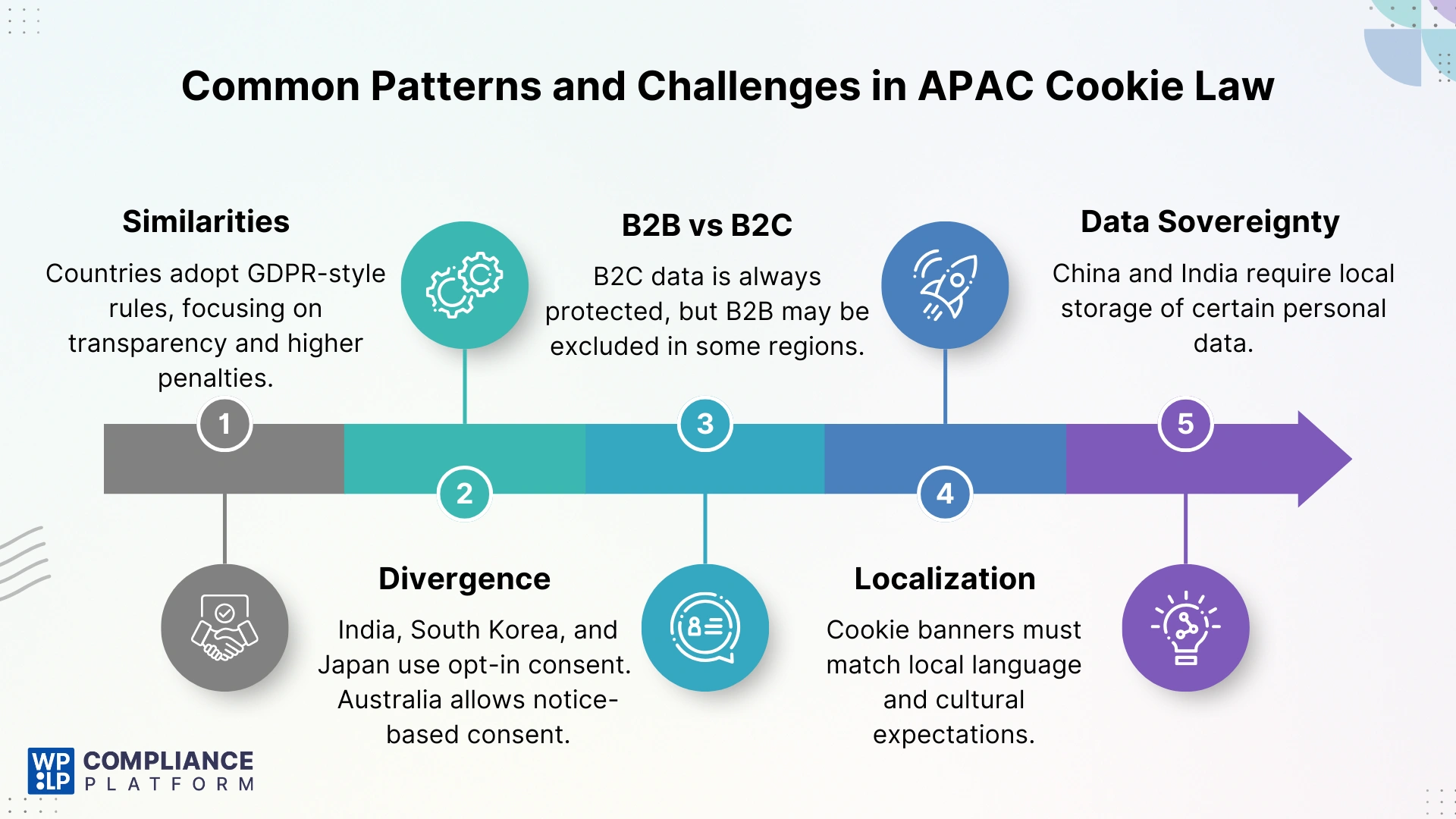
The Regional Similarities
Many APAC countries are adopting GDPR-style laws to build digital trust. A common thread is the increasing focus on transparency and accountability. Most new or updated laws require a comprehensive and accessible privacy policy. Penalties for non-compliance are increasing across the board.
Where Countries Diverge
You can clearly see the difference between opt-in and opt-out in some countries. India, South Korea, and Japan use the opt-in option for third-party data transfers. But countries like Australia have a notice-based approach for non-sensitive data.
Enforcement also varies, with countries like South Korea and India being especially strict about penalizing non-compliance.
B2B vs. B2C Data: Unlike the EU’s GDPR, some APAC cookie laws treat business-to-business (B2B) data differently or don’t cover it at all. Business-to-consumer (B2C) data is almost always protected, so companies must check local laws to see if B2B data falls under consent requirements.
Challenges
Different laws across APAC make it challenging to have one law that fits all. Your business should localize to the language and culture. For example, a cookie in English won’t work in the Japanese market. As a result, this complexity means companies need a scalable and flexible solution.
Data Transfer and Sovereignty: Some APAC cookie laws, like in China and India, require personal data to be stored locally, creating significant challenges for cloud businesses using central servers.
Global vs APAC: International Cookie Law Comparison
Although the EU’s GDPR may have set the bar high, several APAC countries are implementing their own strict, but different, privacy frameworks.
The U.S. has multiple opt-out laws, creating complex rules for global businesses.
Below, we have an international cookie law comparison based on their cookie consent standards.
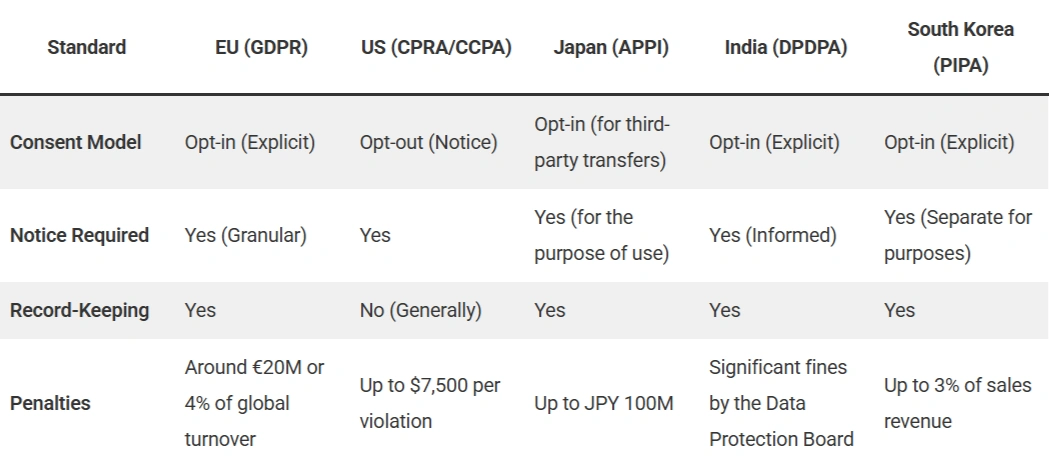
As the table shows, the trend in APAC cookie law is toward a stricter opt-in, EU-style model.
Global businesses can’t rely on a simple “notice only” banner, the traditional U.S. style, to cover their bases anymore.
How Practices Must Shift for Global Businesses:
Global businesses cannot rely on one cookie banner for all of the different regions in which they do business.
- Opt-Out is no Longer Enough: The US-centric “notice only” or “opt-out” approach is not a rich enough consent experience for most of the world. Businesses must move away from a consent framework like opt-out and use a rich opt-in consent experience in high-risk regions such as the EU, India, or South Korea.
- Unbundle Everything: A single button to accept all cookies and tracking is no longer enough to meet modern privacy and consent laws. You need to add a multiple-layer cookie banner that gives your users an overview of what is done with their data.
- Focus on Record Keeping: In regions that have strict consent laws, an auditable consent record is a must for businesses. Additionally, an audit trail will be necessary in the event of an investigation.
- Local for Legal and Cultural Context: A banner that works in Europe will not work in Asia. Businesses must localize their cookie consent banners to include the local language and the specific legal terms of that country.
Let’s see some practical steps you can take to stay compliant with APAC cookie laws.
Practical Steps for Achieving Asia-Pacific Cookie Compliance
Having a strategic plan in place will allow you to be compliant across the many APAC markets.
However, to do so, follow these steps and stay compliant.
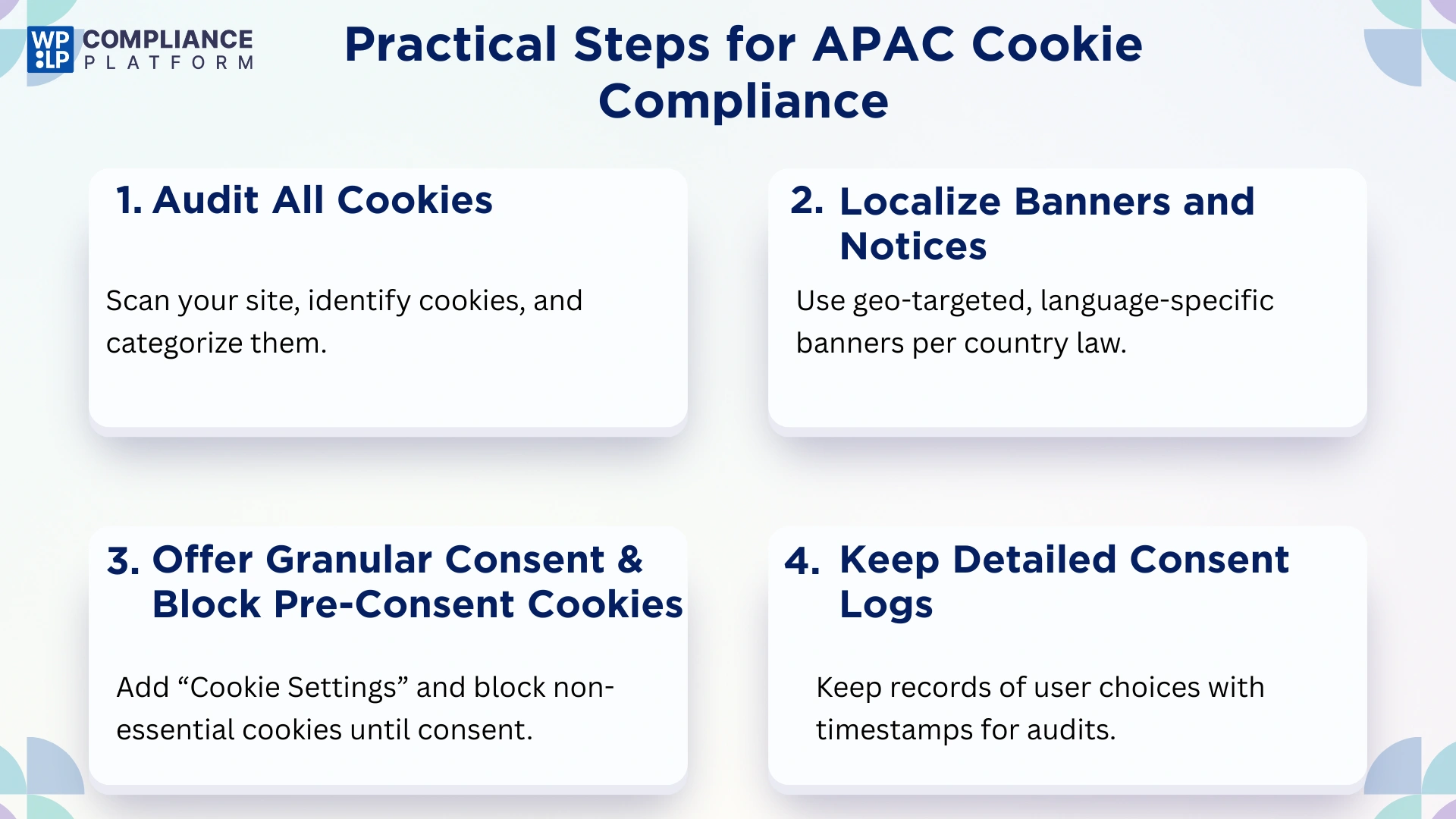
Step 1: Audit All Cookies on Your Website
Before you use a cookie to collect data, you must know what cookie you are using and why you are using it.
Identify all cookies: You should run a cookie scanning tool on every single page of your website. Your audit should also find all first-party and third-party cookies, as well as any other tracking technologies such as pixels or local storage.
Analysis and categorization: If cookies, you must first identify their purpose, what sort of data they collect, the time duration, and the third-party data. Once that is done, categorize cookies into essential, analytics, marketing/advertising, and functional.
Step 2: Localize Cookie Banners and Notices
This is a critical step where many businesses fail, as they don’t follow it.
- Geo-targeting: Your cookie consent banner needs to be customized to appear based on where the user is located. So, a user from India will need a DPDPA / India data protection banner, and an Australian user needs a banner that uses the Privacy Act.
- Language localisation: Don’t rely solely on an English banner for smoother readability. To be legal and show good faith, the banner text, button text, and privacy policy will need to be in the local language of the user’s country.
- Different consent rules per country: The banner will need to meet the legal obligations of the other regions. In India, for example, explicit consent must be given for non-essential cookies to be used, so the banner will need to stop non-essential cookies. Alternatively, in an opt-out region, the banner could provide a generic notice with a link saying, “Do Not Sell/Share My Data.”
Step 3: Offer Granular Consent & Block Pre-Consent Cookies
If you are still using the Accept All button, that is not enough anymore.
- Include a “Cookie Settings” option: Your banner should have options for accepting and rejecting specific cookie categories. This is important to implement as a best practice and is required by law in several jurisdictions (e.g., South Korea’s online tracking law, the EU).
- Block cookies before granting consent: Ensure that your website’s scripts for non-essential cookies are blocked from firing until the user expressly agrees to the cookies. This is the essence of an opt-in compliance model. And try not to use dark patterns in your cookie.
Step 4: Keep Detailed Consent Logs
Your best defense against regulation is the consent log.
- Document all interactions: Your consent management platform (CMP) must have recorded and retained a complete audit trail of each and every user’s consent.
- Document all required information: This audit log should include the user’s IP address, the time stamp when consent was provided, and the specific categories of cookies the user consented to. And a record of the consent banner version that the user was presented with.
Data Transfer & Export Challenges in APAC
Cross-border data transfer regulations in APAC can be stricter than those in Europe.
- Data localization requirements: China and Vietnam have strict rules requiring specific personal data to be stored in the country. India’s data protection law likely has similar rules for its “Significant Data Fiduciaries,” but we have not yet seen the regulations.
- Transfer mechanisms: Some laws require SCCs (standard contractual clauses) or government-sanctioned security assessments before data can leave the country.
- Consent for transfers: In some countries, you need to obtain separate, explicit consent to send data overseas.
Tools & Solutions: How the WPLP Compliance Platform Supports APAC Sites
Manually managing these varied laws is not easy, and you can make some mistakes.
The WPLP Compliance Platform offers a scalable and dependable solution for WordPress sites catering to APAC markets.
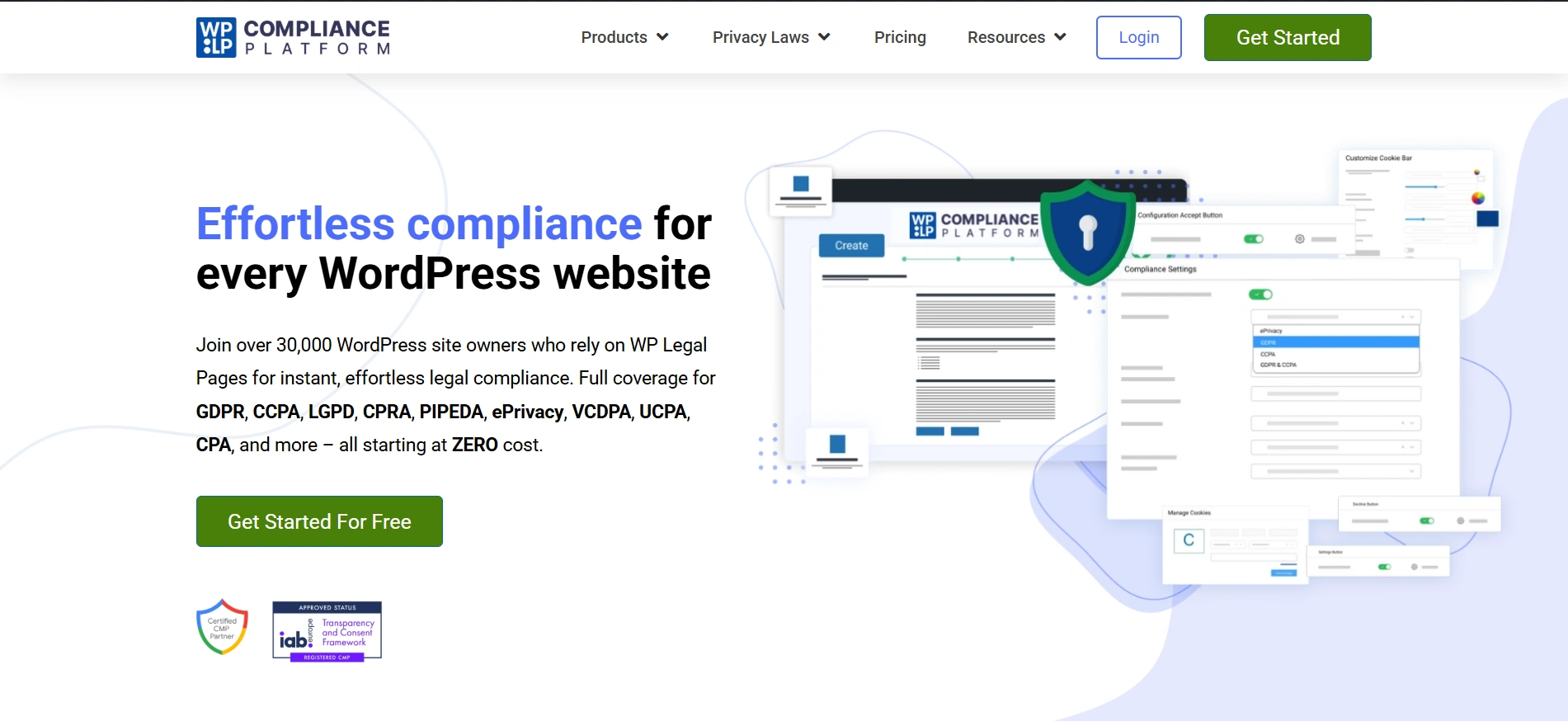
WPLP allows you to:
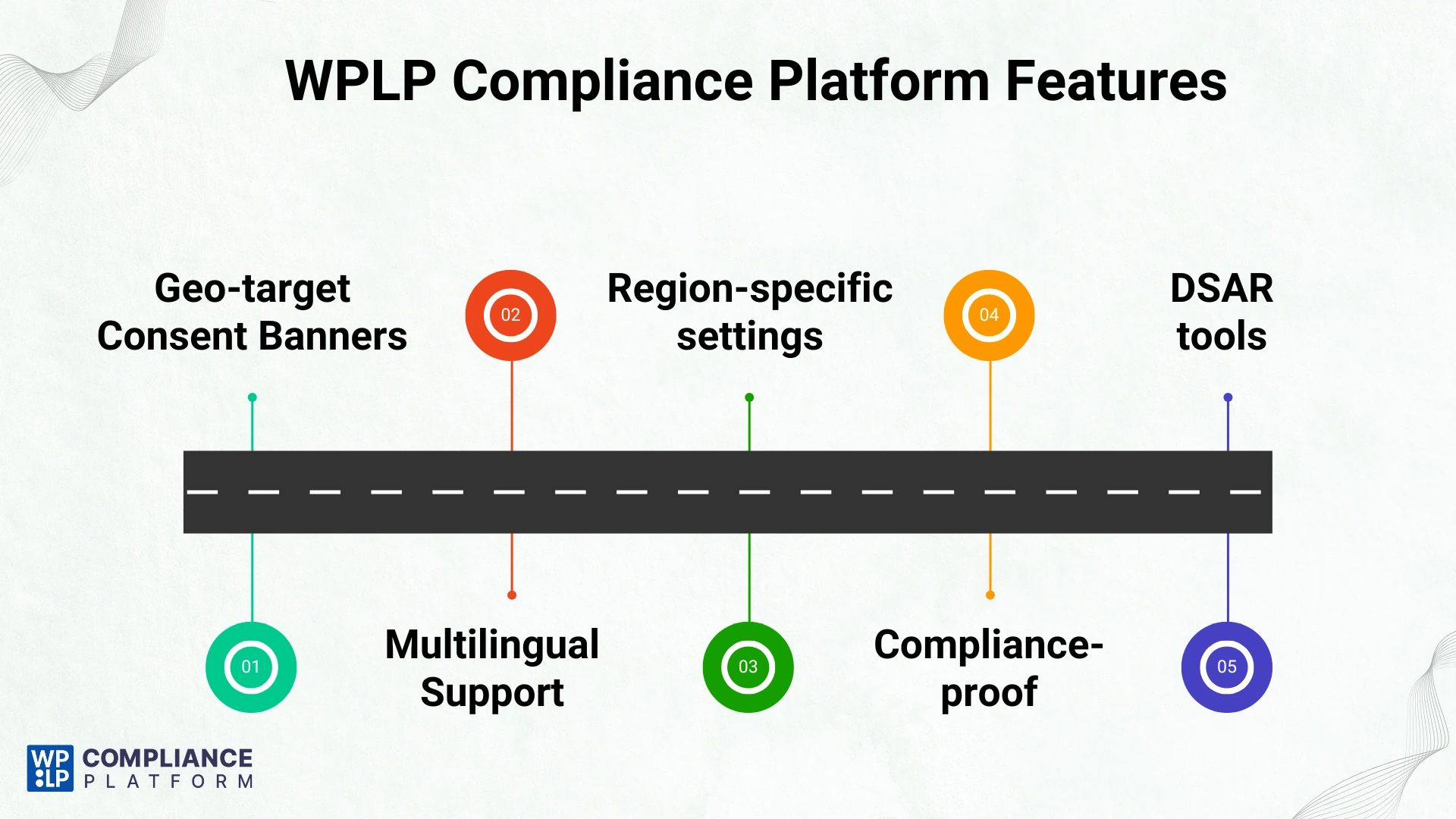
- Geo-target Consent Banners: It automatically shows the visitor the correct, legally compliant cookie banner based on where the visitor is coming from geographically. Moreover, an Indian visitor sees a DPDPA / India data protection compliant banner, and an Australian visitor sees one that is specific to the Privacy Act.
- Multilingual Support: You can easily manage and create consent banners and privacy policies in multiple languages, allowing you to meet the localization needs of each country.
- Region-specific settings: You can configure the cookie behavior of your site based on the specific laws of the country and set it.
- Compliance-proof: WPLP generates and stores detailed consent logs and allows you proof of compliance if you are audited by a regulator.
- DSAR tools: The platform enables you to streamline Data Subject Access Requests (DSARs). Users can request what you have collected about them. The WPLP tools allow you to easily retrieve and provide this information to the user to ensure you can respond to such requests quickly and compliantly.
The WPLP Compliance platform makes APAC cookie compliance reliable and straightforward for all WordPress users.
Ensuring that they can grow their business without any legal risk or penalties.
Frequently Asked Questions (FAQ)
No. Countries like India and South Korea do use it, but countries like Australia are more flexible. A notice-based approach is for sensitive data.
Your banners and policies should be reviewed regularly, especially when regulators release new laws and guidelines. You have to be consistent with it. There is no fixed time period.
Regulators, especially in South Korea and Japan, have been issuing fines for data protection violations. The penalties range from hundreds of thousands to millions.
The best way is to use a dedicated compliance platform such as WPLP, which is able to automate geo-targeting, manage consent logs, and provide multi-language support.
Conclusion
Asia-Pacific regions are now taking data privacy very seriously. Many countries are moving toward a GDPR-style framework.
Stricter laws mean website owners must rethink cookie use, as non-compliance risks heavy fines and reputation damage.
Some countries, like Australia, still allow implied consent under certain conditions, while others, including India, South Korea, and Japan, require strict opt-in consent and impose severe penalties for violations.
To overcome this issue, businesses need a secure, scalable, and reliable solution.
The WPLP Compliance Platform is designed to meet Asia’s privacy compliance. It enables website owners to simplify cookie management, automate geo-targeted consent banners, store audit-ready logs, and handle user rights requests with confidence.
Disclaimer: This article is for informational purposes only and is not legal advice. APAC privacy laws are evolving rapidly, so businesses should review policies and CMPs regularly.
If you like this article, consider reading it.
- American Privacy Rights Act (APRA)
- California Consumer Privacy Act: Become CCPA compliant today
- Swiss Federal Act on Data Protection (FADP) – How to Comply?
Ready to secure your global presence? Grab WPLP Compliance Platform today!
